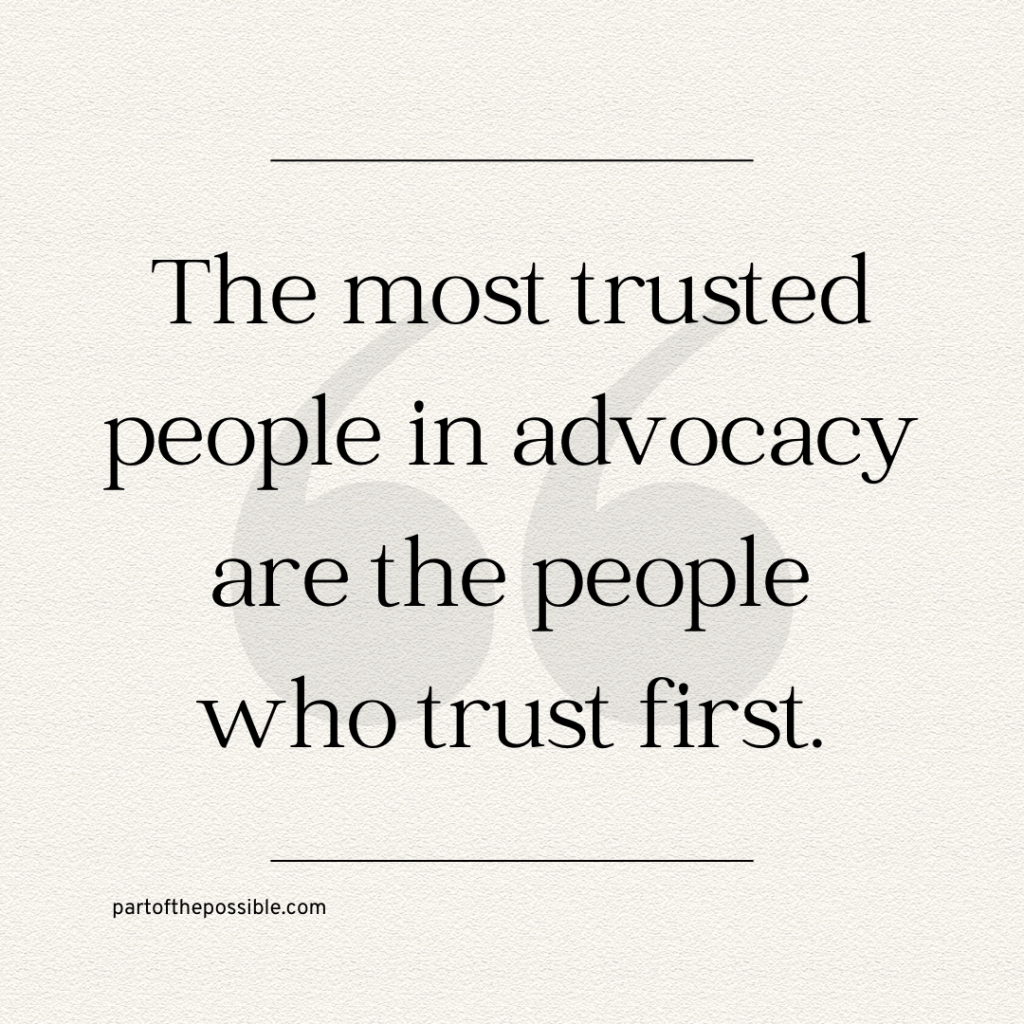Easily one of the hardest things to do in advocacy, is choosing to trust someone you do not like.
Yet that is the task at hand – as much so in 2024 as in any other time.
Recently, my work took me back to Washington, DC for a marathon week of meetings. Meetings to absorb information. Meetings to share priorities with elected officials. And meetings to learn what matters most to other interest groups. It also afforded me an opportunity to connect with advocates who were heading to the Hill.
And wouldn’t you know, I got the question.
It’s the same question – differently worded every time – that I expect to face anytime I work with advocates: “how do I get that bozo to listen to me?” All of us, deep down, are somewhere in the range between worried and absolutely certain we can’t find common ground with “the other side.”
Yet strong advocacy organizations don’t let you sit in a comfort zone. They push you. They challenge you to face opponents and adversaries head on, and in a productive way. They won’t let you hide behind your partisan or factional biases.
But that presents a problem for volunteer advocates. We have to prepare ourselves for contentious meetings, with people we simply do not like. That’s bad enough to keep prospective advocates at an arm’s length from participation. But then someone like me comes along to deliver even worse news. No, you don’t get the luxury of not liking this politician or that one. Rather, we try to highlight just where you might actually appreciate something they’ve done!
There’s a good reason why we’re going to challenge your internal biases more. The most trusted people in advocacy are the people who trust first.
This isn’t some woo-woo, feel good hokum. It’s an experiential lesson for skilled advocates to internalize. When you choose to trust first, add value first, and yes like them first, they are more likely to reciprocate.

You see, DC isn’t half as cynical a city as we make it out to be. It’s actually a city full to the brim with believers and idealists – we just may not align with their beliefs and ideals most of the time.
That’s ok.
As I sat with one group of novice advocates helping them prepare, I asked them what they thought the most important thing they could accomplish that day would be. Of course they responded that getting commitments on our issues was the pinnacle. But then I asked them how they’ll judge success when that hasn’t happened at the end of the day.
A predictable silence followed.
Of course we want clear metrics in advocacy to show we’ve made an impact. But that’s not typically in the cards. No, we’re stuck evaluating our performance by much more subjective criteria.
This group of advocates included farmers who operate family-owned farms across the Midwest. They’re the 1% of the population that provide grain and livestock to the rest of us. And since the Industrial Revolution began peeling Americans away from rural communities into cities, the work they do has become increasingly confusing (and intriguing) to all of us city folk struggling to keep a sourdough starter alive.
Therein lies an opportunity.
I’ve never met a politician who isn’t genuinely intrigued to go learn about an industry that serves a need in their community. They want to learn about the jobs real people perform and understand the challenges in your way. But not too many folks throw open the door and invite the curious to come inside and see that work.
After a few minutes of silence, one of the advocates who I’d worked with previously stumbled on where I was leading him. In his home state, there’s a representative who has a contentious relationship with agriculture. This advocate has written the legislator off. He realized that success on the Hill that day wasn’t going to be a bill sponsorship. Rather, he needed to invite that representative’s staff to come see their work in person.
Yes, in those meetings you need to talk about your issues. Yes, you need to clarify what position you think that elected official should take.
BUT BEFORE ALL OF THAT, you should search for a way to add value to their work – even if you don’t like their politics all that much. For farmers, it’s as simple as inviting someone out for a day on the farm. For a manufacturer, it’s a tour of the factory where they can meet your employees. Fascinating interactions happen at these kinds of events. And the elected official can see you as more of a resource moving forward.
Building trust oftentimes requires offering trust first. To win someone over in advocacy, you have to be willing to forget everything you disagree on, even for just a moment, and focus solely on common ground.
It’s not easy. It’s quite uncomfortable. But in the long run, it makes you more credible. And that’s what we’re after.
One thought on “Step One: Build Trust”